Linux cPanel and Window Plesk Dedicated
HDD Dedicated Server Plan (Choose cPanel or Plesk Control Panel)
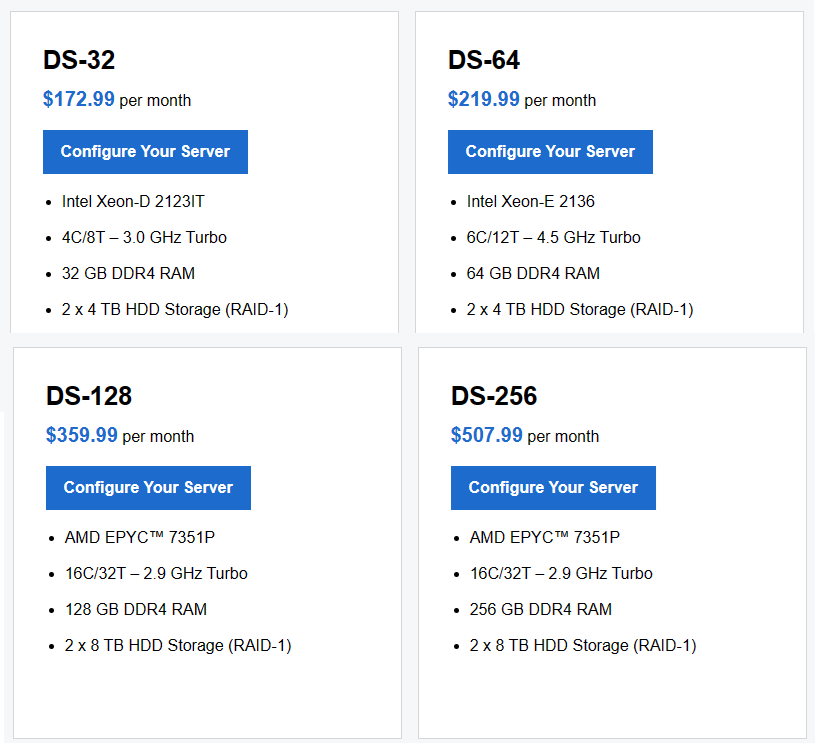
SSD Dedicated Server Plan(Choose cPanel or Plesk Control Panel)
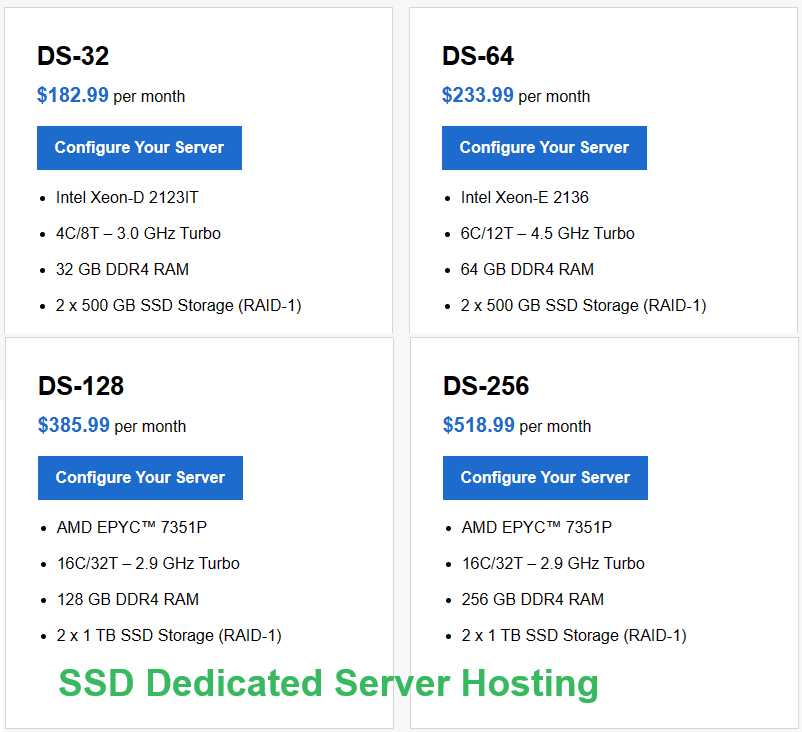
Managed Linux cPanel and Window Plesk Dedicated Server
HDD Managed Dedicated Server (with WHM or Plesk Control Panel)
SSD Managed Dedicated Server (with WHM or Plesk Control Panel)
What is the Difference Between HDD and SSD ?
-
Solid-state drives (SSDs) are the most common storage drives today.
-
SSDs are smaller and faster than hard disk drives (HDDs).
-
SSDs are noiseless and allow PCs to be thinner and more lightweight.
-
Hard disk drives (HDDs) are more common in older devices.
-
If you primarily use your PC for web browsing and light work, you may not need as much storage space.
-
If you work with large videos or files, you may want more storage.
-
If you use OneDrive or another cloud storage service for photos and files, you may need less storage on your device.
HDD (Hard Disk Drive) and SSD (Solid State Drive) are both types of storage devices used in computers, but they have several key differences in terms of their technology, performance, and characteristics:
-
Technology:
- HDD: HDDs use magnetic storage technology. They consist of one or more spinning disks (platters) coated with a magnetic material. Data is stored on these platters in the form of magnetic patterns, and read/write heads access the data as the disks spin.
- SSD: SSDs use NAND-based flash memory to store data. They have no moving parts, and data is stored in memory cells. This lack of mechanical components makes SSDs more resistant to physical shocks and faster than HDDs.
-
Speed:
- HDD: HDDs are relatively slower compared to SSDs. The speed at which data can be read or written is limited by the spinning disks and mechanical read/write heads.
- SSD: SSDs are much faster than HDDs. They offer faster data access times and transfer speeds because there are no physical components that need to move.
-
Durability and Reliability:
- HDD: HDDs are more susceptible to physical damage due to their moving parts. They can be sensitive to shocks, drops, and vibrations.
- SSD: SSDs are more durable because they have no moving parts. They are better equipped to handle physical shocks and are less prone to mechanical failure.
-
Noise and Power Consumption:
- HDD: HDDs can generate noise due to the spinning of the disks and movement of the read/write heads. They also tend to consume more power.
- SSD: SSDs are silent since they have no moving parts. They also generally consume less power compared to HDDs.
-
Size and Weight:
- HDD: HDDs are usually larger and heavier due to the mechanical components required for operation.
- SSD: SSDs are smaller and lighter as they do not require spinning disks or mechanical components.
-
Cost:
- HDD: HDDs are generally less expensive per unit of storage compared to SSDs.
- SSD: SSDs are more expensive, but prices have been decreasing over time as the technology becomes more widespread.
In summary, SSDs offer faster performance, better durability, and energy efficiency compared to HDDs, but they are typically more expensive on a per-gigabyte basis. HDDs are still widely used for large-scale storage needs where cost is a primary consideration, while SSDs are preferred for tasks that demand speed, such as operating system installations and applications that require quick data access.
Levels of Management of Dedicated Serverx Server?
We provide All following features
- Feel at home with cPanel®. Hit the ground running with the industry-standard control panel you already know and love.
- Built to grow with you and your clients. New clients beating down your door? Upgrade plans at anytime without having re-provision.
- Think fast.Crunch numbers at ridiculous speeds with the latest generation Intel® Xeon® processors.
- Keep your data looking good- with disk mirroring.You’re in charge with root (administrative) access to install PHP, modules, server level proxy, and much more.
- Provisioning that’s ready to go now. You and your clients don’t have time to wait. We’ll provision your server in minutes, not hours.
- Access that makes you feel like a VIP.Edit your server files, install Magento or PHP. Do it all with root (administrative) access.
- Never lose your work again.Travel back in time (kind of) to reclaim lost files with Site Backup. Just C$7.99 for 50 GB (optional).
- Need MySQL? You got it.What server would be complete without the world’s most popular open source database? Not ours, that’s for sure. Get MySQL with all of our Linux server plans.
Our servers (both VPS and dedicated) come in three flavors, depending on the support and features you need:
Self Managed Servers are for the pros among us who want as much control as possible. These are great if you’re comfortable with shell prompts and are a seasoned administrator.
Managed Servers were created with most customers in mind. They offer the power of a server, as well as the ease of managing your server through a control panel. However, it’s still significantly more complicated than something like a WYSIWYG program like Website Builder.
Fully Managed Servers give PowerHoster the responsibility of managing and maintaining your server. You’re still responsible for the sites you want to host on the server, but we take care of pretty much everything else.
Comparing Plans
Here’s a break down of what the above information translates to in terms of this and that.
| Feature | Self Managed | Managed | Fully Managed |
|---|---|---|---|
| Automatic Patching | – | ✓ | ✓ |
| Root Access | ✓ | Configurable | Configurable |
| Control Panels | – | ✓ | ✓ |
| Backups: On-Demand | – | ✓ | ✓ |
| Backups: Disaster Recovery | – | ✓ | ✓ |
| SSH | ✓ | ✓ | ✓ |
| Application Manager | – | ✓ | ✓ |
| Dedicated IPs | 1 | 3 | 3 |
| Migrations from Shared Hosting | – | ✓ | ✓ |
| Expert Services (ES) | $ | $ | ✓ |
| Monitoring | Good | Better | Best |
| Seamless upgrades | ✓ | ✓ | ✓ |
| Support: Chat | ✓ | ✓ | ✓ |
| Support: Dedicated Team | – | – | ✓ |
Feature Definitions
Get hip to our lingo…(that’s what the kids say these days, right?)
Patching
When security vulnerabilities are patched, it’s important to get them on your server as soon as possible. Using automatic patching, your server leverages the patching tools available through its operating system or control panel to update potentially problematic elements quickly.
Root Access
To install software on your server through the command line or other administrator-level tasks, you’ll probably need root access. Unless you’re familiar with controlling your server via command line, we don’t recommend using it though; it’s much easier to break your server using the power root access gives you than it is to use the same privileges to fix it.
Control Panels
Manging your server can much more straightforward with a control panel, which creates a user interface to complete administrator-level tasks like creating FTP users and adding websites to your server. Without a control panel, you can only manage your server via command line.
Backups: On-Demand
You’ve seen those warnings where we say, “We recommend backing up your server before making these changes.” This is that backup. Create one backup and restore your server to it if things don’t work out like you anticipated.
Backups: Disaster Recovery
If your server suffers severe breakage, we often have a backup of your server. These restores are available for a fee by contacting customer support.
We do not guarantee that we will have a Disaster Recovery backup of your server. We make a best effort to keep these available, but you cannot rely on this backup’s availability.
SSH Access
Pros who use servers often find that rather than dealing with a GUI, it’s quicker and easier for them to just issue commands to the server themselves; SSH is the means by which they can do that.
Application Manager
Installing applications like WordPress or Drupal grows increasingly tedious the more often you do it. With an application manager, you’ll have a vast library of apps from which to choose, as well as the tools for features like automatic updates and relocating the application on your server.
Migrations from Shared Hosting
Upgrading from shared hosting to a server has a lot of benefits, but if you were apprehensive about moving your site, our migration tool makes it really easy. With nothing more than a few clicks, we sweep your old shared hosting account up into your server and set everything up for you.
Right now, this feature is available only for cPanel/Linux accounts, but we will add the features for Plesk soon.
Expert Services (ES)
Much like contracting out your home remodeling efforts, our server admins are available to spruce up/patch/overhaul components of your server. We have the entire list available in our Hosting Services Menu.
Monitoring
There are two primary elements we monitor:
- Our network, to ensure it stays healthy and happy, successfully routing your server’s visitors to it.
- Your server’s container, which uses NodePing and other technologies to make sure your server’s successfully responding to requests.
Each of our server support tiers offers a different monitoring system:
Self Managed/Good only includes network monitoring to make sure you’re not getting DDoSed.
Managed/Better includes network and container monitoring so you’ll know if your server ever went down.
Fully Managed/Best includes network and container monitoring, as well as a team of server professionals that will address any issues your monitoring reports.
Seamless Upgrades
If you find that you need a more powerful server, we offer in-place upgrades that require no work on your end.
Support: Chat
You’re stuck and want a quick answer. Check out what we support in
Support: Dedicated Team
Our Fully Managed Servers include the kind of white-glove service you expect, including dedicated teams of server admins you can reach out to if you need anything done on your server.
What is a Dedicated Server?
A Server describes a special computer that is configured to provide services such as Hosting (a rented space for your website to exist on the Internet) and Email services (a point of presence (POP) where your emails are collected and sent on to you. DNS system and more configurations. A Dedicated Server is dedicated to one Organization so that only their websites or email accounts or their customers’ websites and email accounts exist on that server.
Cheap hosting services use Virtual Private Servers (VPS). In effect it means you can be sharing the server with many other unknown people from anywhere in the world. It could be a hobbyist in China or someone in Russia playing with experimental code to SPAM people. Some websites are hosting gambling and adult websites, some websites are running warez websites which are all beyond your control. Some bad webmasters even try to hacker some other websites using Malicious Spyware or Viruses which will eventually affect your websites.
When you are running a big Website, you need a dedicated server: A big website need a lot of sources including CPU and memory even Disk Space. When you run a big website, you will occupy too much cpu resources or memory resources. Your hosting provider will notify you to move to a dedicated hosting plan. Or your website will affect all the websites in your shared server. Normally your website should be suspended immediately and other website can run smoothly.
You need Better Server Performance and Response Time, you need a dedicated server: On shared hosting, with other sharing the same resources, allot of traffic can be generated which could drain resources such as bandwidth which could lead to slow response time and slow loading time. This does not happen on a dedicated server because you are not sharing resources.
When your Bandwidth or Disk Space is big enough, You need a dedicated server: With shared hosting, the amount of disk space and bandwidth you are allotted is limited because there are others sharing the server. With dedicated hosting, bandwidth and disk space are dedicated to you only so there is no sharing and no limitations on the amount of space available space.
Dedicated Hosting Needs Technical Skills but Cpanel and Plesk Control Panel will make a dumb admin to be OK to manage the Dedicated Servers but you still need some webmaster skills to set up, administer, and manage the server.
Blacklisting Of Website by Google: In a shared server, there is more of a risk of being blacklisted by search engines because someone else on the server engaging in such practices as spamming may get the entire IP address blacklisted. On a dedicated server, you will not get blacklisted unless you engage in unethical internet practices.
Level of Control: A dedicated server offers more control over the server as they can add their preferred programs, applications, and scripts. You will have improved flexibility and security which is very beneficial.
The hosting type that you choose will depend on your budget, server and website needs, and the amount control that you desire. No matter which type of server hosting you choose, it is important to make an informed decision.
We use several dedicated servers configuring separate servers for the email services as distinct from hosting your website. The Servers are proactively monitored, regularly updated and backed up every week by our dedicated server team keeping them secure and performing at optimum levels. You can enjoy the peace of mind that your Hosting solution is in safe hands, at all times.
 |
 |
 |
Frequently asked questions about Linux cPanel Servers
Will I be able to manage my server through a web-based control panel?
Yes. Every dedicated server hosting plan comes with Web Host Manager (WHM), which gives you complete control over creating and customizing your account, as well as managing all aspects of your server.
How to Patch my Server ?
To protect yourself from security vulnerabilities, you must patch your server regularly. Developing a monthly or weekly habit of performing this simple task can save you a lot of grief and hassle later on.
If you use whm/cpanel control panel. The control panel will remind you of updating and patching when you login. If you do not want to upgrade or patch by control panel, you can run following command.
Fedora or Cent OS patch server command
- Connect to your server via SSH
- Switch to the root user .
- Run the following:
yum clean all
yum update
Ubuntu patch server command
- Connect to your server via SSH.
- Switch to the root user.
- Run the following:
apt-get upgrade
Can I upgrade my VPS hosting account to a dedicated server?
Yes. If you currently have a VPS hosting account with us, you can upgrade to our dedicated hosting at any time by ordering a new server. For fully managed customers, we will migrate your data from your current account to your new server. You can also upgrade either your VPS or your dedicated server with Premium DNS, which improves both your security and performance.
Can I upgrade my VPS to dedicated server hosting?
We want you up and running as soon as possible. Our standard dedicated hosting server configurations can be set up in minutes. However, some server add-ons and custom configurations may require longer setup times.
What is RAID?
Redundant Array of Independent Disks (RAID) is a means for storing data on multiple hard disks, then linking the disks so that the operating system on your server views them as a single entity. We offer RAID-1 with our Windows dedicated server hosting.
This RAID method of data storage is known as mirroring. Data is written to at least two disks, which offers a high degree of data security, but incurs a slight performance decrease due to capturing data on two disks.
How do you monitor your data centers and servers?
Our GoDaddy team is on-site and available 24/7/365 to ensure our servers – and your sites – are running at peak performance.
 |
 |
 |
Dedicated Servers
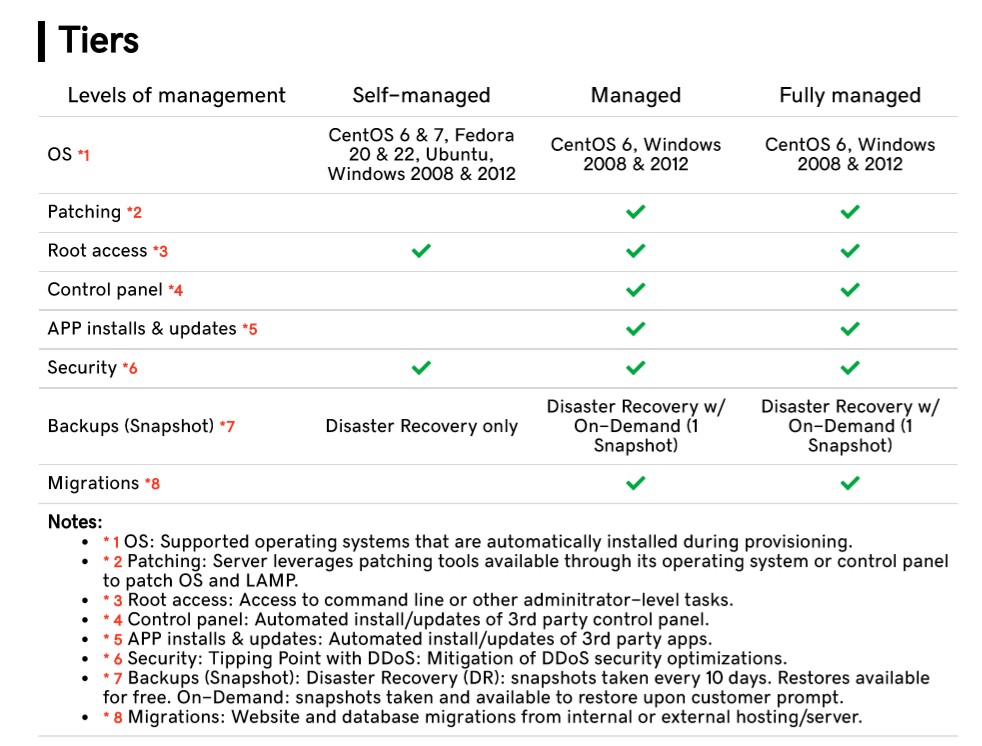
When you decide the server management level, you should ask yourself three questions:
- Do I have a administrator ?
- Am I good at server management ?
- What is my budget to get my website run smoothly.
If you have no experience to manage a server, or you do not have a administrator, we suggest you use a managed server. It is very easy to manage and it is very easy to know how to use cPanel or Plesk control panel.
If you don’t have server management experience, you will likely benefit from our Fully Managed services. Our Fully Managed admins are available 24/7 and will help you perform tasks such as setting up a cPanel or DNS for domains, or more advanced functions such as apache tuning and MySQL optimization.
Leave a Reply
Fully Managed – CentOS 6
Managed – CentOS 6
Self Managed – Choice of Ubuntu, Fedora, CentOS6, or CentOS 7
Leave a Reply
It is incredibly important to ensure we match the customer up with an appropriate server level
Fully-Managed – Customers have the option to enable root/administrative access (though not recommended). We will handle core patching, security, monitoring, and backups. Backups are snapshots taken on a 10-day cycle. Restores are available upon request.
Managed (MOST POPULAR) – They will get root/administrative access to the server and includes Plesk or cPanel. We handle core patching, security, monitoring, and backups. The backups we offer are snapshots taken on a 10-day cycle and paid restores are available upon request. Additional configurations and installations can be performed for an additional fee.
Self-Managed – The customer gets a server with no control panel and a connection to the internet. EVERYTHING has to be manually configured.

Notes:
* 1 OS: Supported operating systems that are automatically installed during provisioning.
* 2 Patching: Server leverages patching tools available through its operating system or control panel to patch OS and LAMP.
* 3 Root access: Access to command line or other adminitrator-level tasks.
* 4 Control panel: Automated install/updates of 3rd party control panel.
* 5 APP installs & updates: Automated install/updates of 3rd party apps.
* 6 Security: Tipping Point with DDoS: Mitigation of DDoS security optimizations.
* 7 Backups (Snapshot): Disaster Recovery (DR): snapshots taken every 10 days. Restores available for free. On-Demand: snapshots taken and available to restore upon customer prompt.
* 8 Migrations: Website and database migrations from internal or external hosting/server.
Leave a Reply
VPS benefits
- Shared with fewer clients vs. Shared hosting
- Admin/root access
- Full admin control over database server
- Ability to install custom applications/languages/modules
Dedicated server hosting benefits
- Single-tenant server
- Ability to purchase large amounts of RAM
- Admin/root access
- Full admin control over database server
- Ability to install custom applications/languages/modules
Leave a Reply
A Web Application Firewall (WAF) protects websites from malicious bots or hackers’ attempts to break into websites. Attacking websites through applications like blogs or shopping carts has become the leading way for hackers and cybercriminals to bypass traditional security measures and steal data or traffic.
Every day, thousands of sites are compromised through this process.
The WAF is an included feature with Managed and Fully Managed hosting. By coupling WAF with CDN, we provide the fastest and most secure experience for your website.
Leave a Reply
A content delivery network (CDN) is a large distributed system of servers that are deployed in multiple data centers across the world. This system delivers web pages and other content based on the geographic locations of the customer, the origin of the web page and where the content delivery server is located.
The closer the CDN server is to the customer geographically, the faster the content is delivered. This is especially beneficial for dynamic content, such as pictures or intense transaction-based ecommerce sites.
The CDN is an included feature in Managed and Fully Managed packaged. By coupling CDN with WAF, we provide the fastest and most secure experience for your website
Leave a Reply
No. It is not necessary.
The database should be reviewed for large tables taking up space. In the case of WordPress, SPAM comments can result in many GBs of usage that can be easily deleted to get the database within your “limits”.
If a customer has reviewed their database completely and still needs the additional space, a server may be appropriate.
Leave a Reply
In the case of over-utilization due to a database query, moving to a server can either be a “band-aid” or further detrimental to the site. Legacy hosting has separate “web” and “database” servers, whereas a VPS would have both
on the same server. If this, along with the bad query, does not negatively impact the site immediately, it will as the site gains visitors.
In the case of over-utilization due to CPU or Memory usage, moving to a server can also be a “band-aid”. The underlying issue with the scripting needs to be addressed prior to any upgrade. Left unchanged, the site will be negatively impacted as traffic increases to the site – the “when” will vary depending on the traDc and the server purchased.
Leave a Reply
It’s great to have dreams and plans, but it may be more appropriate to start off on shared hosting or a VPS and upgrade as the need arises.
Leave a Reply
Normally VPS hosting is OK for most of websites, but you can also use a dedicated web hosting service if you answer yes to any of following questions:
- Do need more than 240GB of disk space?
- Are you looking to run software that requires multiple CPU cores such as paid versions of SQL Server?
- Do you need more than 8GB of RAM?
- Is reliability and stability so important that you want to pay more to ensure they have no neighbors?
If the answer is yes to any of these, you will want to be on a dedicated server.
If you did not answer yes to any of these and the are not sure if you need a dedicated server, you will likely need a VPS.
VPS Hosting
Virtual Private Server (VPS) hosting is where multiple websites use the same server, but have their own set resource limits on things like RAM and bandwidth. It also uses what’s known as a hypervisor (specialist software) to borrow resources from the other sites on the server if you’re maxed out and others aren’t using their full allocation.
A Virtual Private Server (VPS) is a virtualized server, hosted on portion of a physical dedicated server. A VPS acts as a fully dedicated server, with it’s own operating system, storage, memory and bandwidth. This means that a VPS can act like a dedicated server, at a lower cost than a dedicated server.
Generally, VPS hosting is suited to small business websites, or large personal sites that need decent resource limits. No one wants the pain of slow loading speeds on their site, or worse still, to have their site constantly crashing. That’s why VPS hosting works well – it’s flexible in handling surges of traffic, and isn’t too expensive.
Advantages of VPS hosting
VPS hosting is the perfect balance of price, performance, security, affordability, and privacy. Some of the amazing benefits you will get by using the services are;
- Shared cost of services
- Quick server setup
- Better server access with more control
- Private contained environment
- Similar level of services as with a dedicated server
- Scalability for better long term use
Dedicated Hosting
Dedicated hosting is the big cheese of the web hosting space. You don’t simply get a slice of stilton or a chunk of cheddar – you get the whole wheel of wensleydale. In essence, you have an entire server to yourself. You’re in total control from the get-go, and can choose your own resource limits. Dedicated hosting tends to be for medium to big business sites, but if you’re ambitious, you can save time and hassle in the long-run by signing up to a dedicated plan (safe in the knowledge your site will grow to that level).
Making that call isn’t easy, though. Many may find themselves caught in two minds over which type of hosting to go for – in which case, allow us to help! We’ve spent our fair share of time online, and know out stuff about website hosting.
Through a series of analogies, we’ll help you break down the differences between VPS and dedicated hosting. By the end of this guide, there should be little doubt in your mind over which hosting plan to go for.
Leave a Reply
There is no upgrade path from a VPS to a Dedicated server. If the customer needs to move from a VPS to a Dedicated server, they would need to purchase a new Dedicated server, move their content, and re-setup everything.
If the customer is concerned about exceeding the limits of a VPS, it would be better to recommend getting a smaller Dedicated server and allow room to grow into it.
Leave a Reply
No. This will not work in our environment.
But you can run your WHM and create your reseller account to sell web hosting services.
Leave a Reply
Will I be Able to Manage my Server Through a Web-based Control Panel?
Managed and Fully Managed servers come with a web-based control panel. Linux plans include Web Host Manager (WHM) while Windows plans include Plesk. These will give you complete control over creating and customizing your account, as well as managing all aspects of your server.
How Long Does it Take to get my Server Set up?
We want you up and running as soon as possible. Our standard server configurations can be set up in minutes, however some server add-ons and custom configurations may require longer setup times.
How do you monitor your data centers and servers?
Our World-Class team is on-site and available 24/7/365 to ensure our servers – and your sites – are running at peak performance.


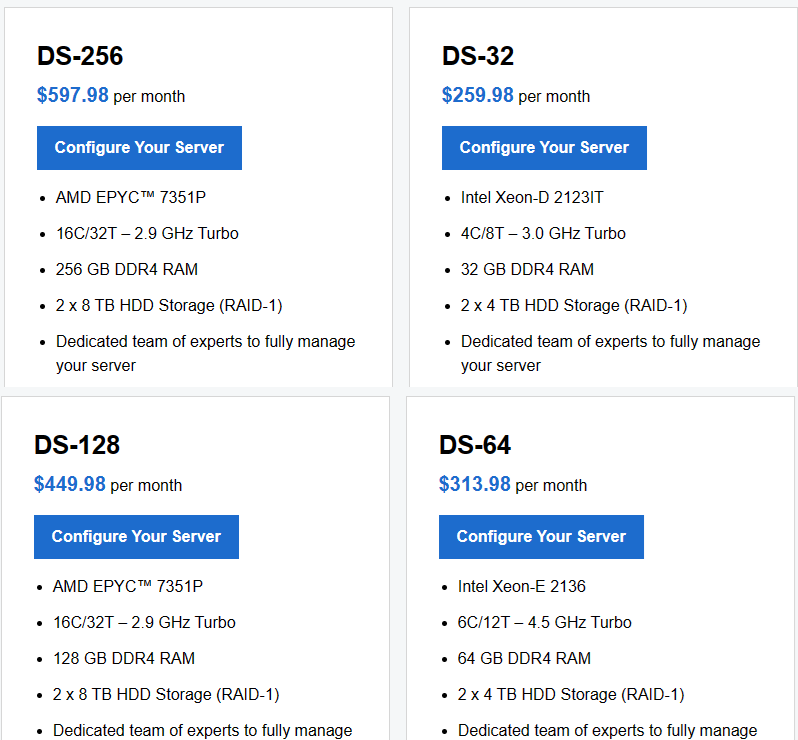
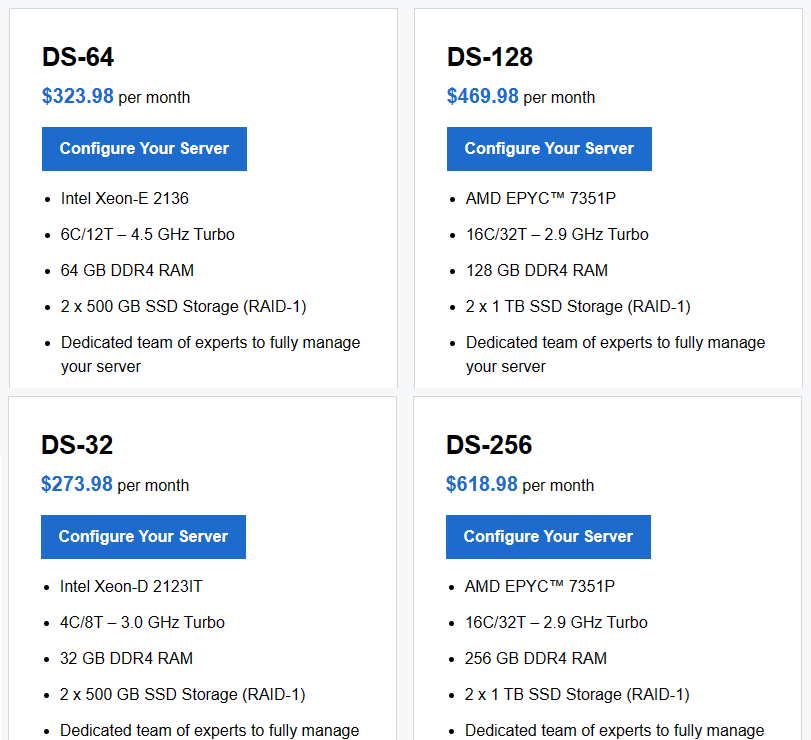
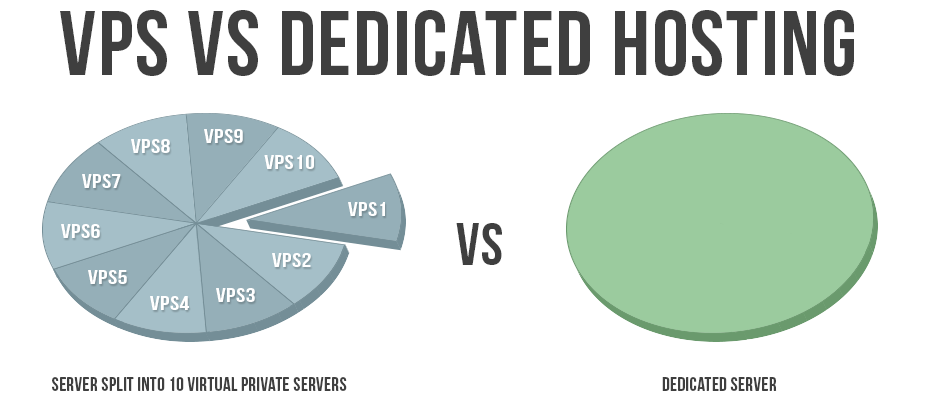
Leave a Reply